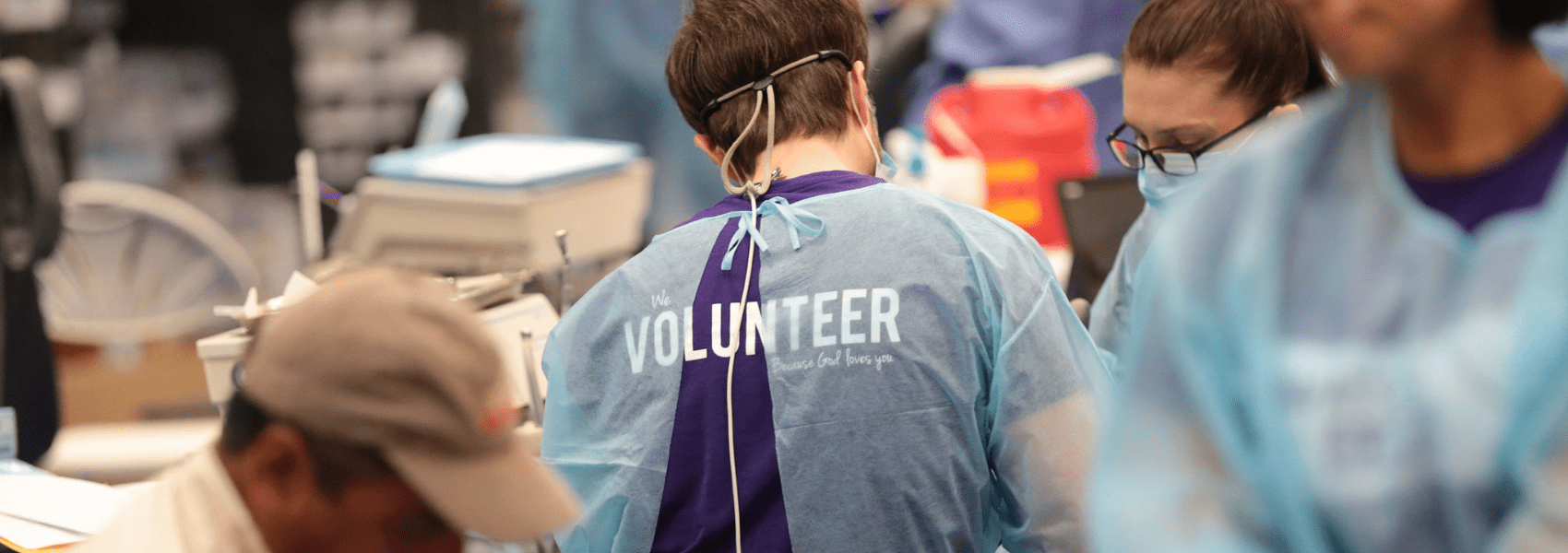Dental professional Ilya volunteered at the very first Compassion Clinic in Rockwood in 2006 as a student. When he became an instructor he immediately began recruiting students to follow in his footsteps and experience the joy of service. His colleague Tracy joined him along the way and both of them have a wealth of Compassion Clinic stories built up over their years of volunteering. We are very grateful to them for sharing some thoughts about why they volunteer, why dental services are so essential during the pandemic, and how volunteering invigorates their faith.
The Student Becomes the Teacher
Ilya: I work full time at Mount Hood Community College (MHCC) as the clinic coordinator for the first year of the program. Tracy is one of our part time instructors. She’s a clinical instructor in the junior clinic. We have 18 first years and 18 second years in the program each year. Usually it’s the second year students that go out onto clinical rotations to do these Compassion Clinics on the weekend.
My wife and I have three kids. We love the Compassion Clinics, we get energized by them. They’re just so amazing to be a part of. I can’t wait until the kids are a little older because I will be gladly taking them to the events and showing them what we do in our volunteer roles serving the community.
I started volunteering with Compassion Connect back when I was a student myself. That’s when Compassion Connect first was born back in 2006. Then when I became an instructor, I thought it’d be really cool if we could get these students volunteering before they graduate so they get comfortable with the environment. We’re hoping to get them comfortable in these kinds of roles so that when they graduate they continue to serve.
At one of the last Clinics one of our alumni came back with her husband who is a dentist. I had sent out an email to the last five graduated classes of students from Mount Hood. It was a big deal that she brought her husband, because it’s really hard to find dentists to volunteer. I was really excited to have them join us and I hope they will come back in the future to serve.
“It’s a different kind of appreciation when you clean someone’s teeth at the dental office when they come in to get their regular maintenance. At a Compassion Clinic though it could be the simplest thing you did for this person. But they are saying thank you from the depths of their soul.”
Tracy: I grew up in a rural setting in North Dakota. From a young age, I knew that I had an attraction to serving. I would serve coffee and rolls and help with cleaning at church. I had little to no dental dental care growing up, but one year I came home from college on a Christmas vacation and my orthodontist suggested that I look into dental hygiene. In my town we didn’t have a hygienist, nobody cleaned our teeth. That was where my world finally collided from my childhood of wanting to serve and love and care for people.
Because of that interception from my orthodontist, I finally got a taste of how I could maybe change something for the better in a patient’s life. Maybe it was for their oral health or maybe I was just the person that they needed to have listen to them that day.
My first Compassion Clinic that I ever experienced I was out on the dental van where the dentist was working, because they were short for whatever reason. And I’ll never forget that day because I’d always been in this perfect little cubicle at work where people have maintained their teeth and their health and then to go into the dental van my eyes were practically falling out of my head. The thing that hit my heart the most is how appreciative the people were. They were just so appreciative and respectful and I knew right then and there, ‘I have to be more involved with this.’
So now I try to make every Clinic I can. I just feel like I could fly home afterwards because it’s invigorating, it’s rejuvenating, it’s using my talent and my brain in a completely different way. I get fulfilled in a lot of ways in my career, but this is special. The experience that I’ve had at the Compassion Clinics, I just leave wanting more.
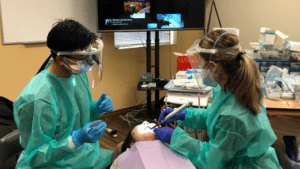
Dental volunteers at a recent Compassion mini-Clinic in SE Portland
“Our students are doing these extracurricular activities where they’re seeing faith in action, giving back to the community, being the hands and feet of Jesus.”
Instilling the Value of Service In the Next Generation
Tracy: It’s a different kind of appreciation when you clean someone’s teeth at the dental office when they come in to get their regular maintenance. At a Compassion Clinic though it could be the simplest thing for this person. But they’re like, thank you, it’s so profound, it’s in their eyes. They are saying thank you from the depths of their soul. That is something I would love for a student to feel, you know, versus people who come in and go out every six months and think life’s good. This is different.
Ilya: As a teacher, there are certain technical skills that we can teach like how to hold an instrument, how to adapt it around a tooth, how to remove tartar deposit stains, but we can’t teach the heart skills and that’s something that we are able to work on by just bringing them to a Compassion Clinic.
It’s so wonderful to see students who sign up to serve. And when I look on the signup sheet and we see the same names going back for the next clinic and the one after that it’s like, ‘wow, these people, they really want to be there.’
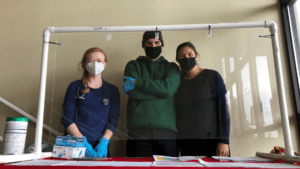
Cheerful volunteers greeting guests at a September 2020 mini-Clinic in Gresham
An Essential Service for Our Neighbors
Ilya: I recently overheard our program director sharing why our MHCC clinic wasn’t shut down and why our college is still allowing dental hygiene in person, when a lot of other programs are shut down for in person services. The Higher Education Coordinating Committee is saying Governor Brown’s order doesn’t extend to us because we’re deemed an essential service.
So if we’re going to extend that to Compassion Connect, there’s a lot of underserved people that are homeless, that are low income, that may not have dental insurance or may not have a place that’s affordable for them. They’re not going to have the money to pay out of pocket for a cleaning or a dental exam or maybe fillings or extractions, that they would be able to receive with Compassion. So it’s a very, very critical resource for them. There are people that are living with pain, and the pain just gets worse and worse.
Sometimes we go out to the Compassion Clinics and we see somebody with a cavity and we think ‘how in the world are you able to tolerate that level of pain from a cavity that big,’ because if that was me I’d have to take a sick day from work, I couldn’t just tolerate it. There’s a lot of people who live with these cavities that are growing to the point where it’s so large that it gets into their pulp and the root dies. Eventually, after tolerating the pain and fighting it with some mega doses of over the counter pain pills, then the nerve dies and they have a tooth that’s rotted out. Then they might have to get it extracted because it may be too late to do a root canal to save it. And they would never be able to afford the root canal to begin with.
“For the patients out there who need our care, where else are they going to turn? I mean, we’re one of the only safety nets for them. The options for them to get care are very slim.”
So these services, you know, trying to catch the cavities early and doing the fillings or maybe even an extraction if it’s too far gone, are really, really important. I think a lot of us in the dental industry, we sometimes forget or we take these services for granted, because we’ve never lived with tooth pain.
There’s a huge need out there. And I really hope that we can continue to have these essential services, even through the COVID pandemic. There’s a fear out there about all this, you know, ‘should we or should we not operate? Are we spreading more of this COVID around?’
I’m personally not scared to go out and serve at these Compassion Clinics. I know there’s people who are very hesitant. But for the patients out there who need our care, where else are they going to turn? I mean, we’re one of the only safety nets for them. The options for them to get care are very slim. Do they just hold on until they finally have to break and go to the emergency room because there is so much pain? At that point they would need prescription pain medications and antibiotics and even that still wouldn’t treat the root cause–it’s only a bandaid, it’s temporary. And if you’re somebody who is already an underserved population the issues are going to snowball even faster. So it’s critical to have Compassion Clinics as a safety net.
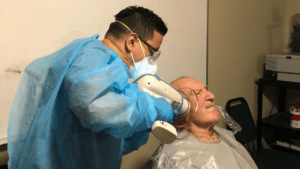
A volunteer providing dental services for a guest at a Fall 2020 Compassion Clinic
Tracy: It’s heartbreaking. It’s really good that we have been considered essential now because when this first round of quarantine went down in March, hygiene was considered non-essential. We went three months without being able to clean people’s teeth. Well, nobody’s gonna die in three months if they don’t get their teeth cleaned but over time it definitely adds up. Our mouth is the gateway to our overall health, so if you let things get disarrayed in your mouth, it penetrates down to the rest of your body.
Small Sacrifice, Infinite Reward
Tracy: Sometimes at the Compassion Clinics there’s an open door to share something about knowing the Lord. That’s part of why I love the Compassion Clinics too, because we have this platform to not only be a healthcare provider but to share something that maybe they’re searching for and came there looking for.
Out in the dental van, I had an experience one time with a middle aged woman who came in complaining of her front tooth. We could see right away this tooth had severe gum disease because it had started to erupt out of her mouth and was catching on her lip. We had the dentist come in and got the diagnosis which was to extract the tooth because there was nothing more we could do for it. We explained that to the guest and she nodded a lot like she understood.
“The Clinic volunteers are amazing people. I just feel like when I come together with them that these are the best hearts in the world. They are my tribe. This is just the best fellowship and camaraderie that anybody could ask for.”
And then I did the anesthetic so that she would be nice and comfortable. Before we actually did the extraction, she says ‘just wait a minute, because I just want to make sure I understand what you’re going to do. Are you going to put a tooth back in its spot?’ And so we explained to her that wouldn’t be the case and it was like this peace kind of came over her.
After the procedure, even though there was a space there now, she could still talk in a way where she might be able to protect that. The most important thing was before she just felt like she wanted to wear a bag on her head, but now she wasn’t afraid to look somebody in the eye. And she just grabbed me and gave me the biggest hug. That made my day.
Ilya: When I volunteered at the Clinic in September, it was pretty packed. Before getting started we did a mini orientation and then a prayer together in the parking lot. And of course, our students were there and we teachers were there bowing our heads and praying. Nobody’s required to participate, you know, because there might be folks there that are not people of faith. They may not be praying, but they’re still being exposed. Our students are doing these extracurricular activities where they’re seeing faith in action, giving back to the community, being the hands and feet of Jesus.
It’s so amazing to see that this is all being done in the name of Christ. After I left that Clinic, I felt like I was flying, I can’t even describe it. It’s just this amazing feeling where I’m not just giving back to the community, I’m also instilling these values in our students.
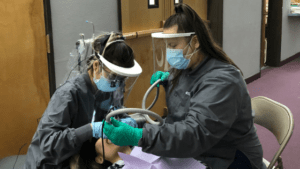
Ilya and Tracy are both extremely thankful for the churches that host the Compassion Clinics
“Giving back to the community is something that I think is so important. It’s so important to love your neighbors. It really is the least that I can do to give back to my community to show the love of Christ to them. It doesn’t require a lot of me like when you really think about it. But it makes such a huge difference for a lot of people.”
The Clinic volunteers are amazing people. I just feel like when I come together with them that these are the best hearts in the world. They are my tribe. This is just the best fellowship and camaraderie that anybody could ask for.
Giving back to the community is something that I think is so important. It’s so important to love your neighbors. It really is the least that I can do to give back to my community to show the love of Christ to them. It doesn’t require a lot of me like when you really think about it. But it makes such a huge difference for a lot of people. I really think it’s great that we’re able to give back in this capacity and to live out our faith, to be able to demonstrate it. I think it does a whole lot for me, I would say even more so for me than what I’m giving to other people.
We’re not just a Church to serve ourselves and our members, we’re there to serve our neighbors in need around us, even if they don’t share the same faith background as us. And even if that doesn’t make them an overnight believer, it’ll at least give them a positive outlook on the faith community here. They’re going to look at it favorably, like ‘you know what, you guys are doing great things in the name of Christ. So you know, why not support you? Why not love the churches that are our neighbors?’
And you know, at the Compassion Clinics it’s not just medical and dental, it’s a shower, a sandwich, a haircut, a massage, a caring conversation. The dental clinic? That’s just one part of the whole.
To learn more about Compassion Clinics, visit us here.


